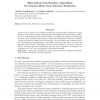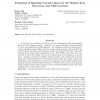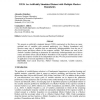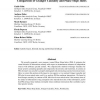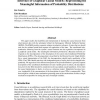131
click to vote
JMLR
2010
14 years 7 months ago
2010
Machine learning methods that can use additional knowledge in their inference process are central to the development of integrative bioinformatics. Inclusion of background knowled...
116
click to vote
JMLR
2010
14 years 7 months ago
2010
In this work we propose new ensemble methods for the hierarchical classification of gene functions. Our methods exploit the hierarchical relationships between the classes in diffe...
112
click to vote
JMLR
2010
14 years 7 months ago
2010
The scientific literature is a rich and challenging data source for research in systems biology, providing numerous interactions between biological entities. Text mining technique...
JMLR
2010
14 years 7 months ago
2010
In a typical Genetic Association Study (GAS) several hundreds to millions of genomic variables are measured and tested for association with a given set of a phenotypic variables (...
128
Voted
JMLR
2010
14 years 7 months ago
2010
Data extracted from microarrays are now considered an important source of knowledge about various diseases. Several studies based on microarray data and the use of receiver operat...
91
Voted
JMLR
2010
14 years 7 months ago
2010
In this study, we combined the ChIP-seq and the transcriptome data and integrated these data into signaling cascades. Integration was realized through a framework based on data- a...
76
Voted
JMLR
2010
14 years 7 months ago
2010
We present an artificially simulated dataset (TIED) constructed so that there are many minimal sets of variables with maximal predictivity (i.e., Markov boundaries) and likewise m...
85
Voted
JMLR
2010
14 years 7 months ago
2010
We recently proposed a new measure, termed Phase Slope Index (PSI), It estimates the causal direction of interactions robustly with respect to instantaneous mixtures of independen...
121
Voted
JMLR
2010
14 years 7 months ago
2010
This paper studies the feasibility and interpretation of learning the causal structure from observational data with the principles behind the Kolmogorov Minimal Sufficient Statist...
81
Voted
JMLR
2010
14 years 7 months ago
2010

